Renting a car in Vietnam offers a practical and enjoyable transportation option for travelers who want to explore the country freely. Especially for those wishing to travel to natural areas, coastal towns, or rural regions outside the major cities, car rental provides significant advantages in terms of flexibility and comfort. However, road conditions, traffic structure, and legal regulations in Vietnam may differ from many other countries. Therefore, it is very important to know the basic rules and common practices before renting a car.
Many factors can directly affect the rental process, from driver’s license requirements for foreign drivers to traffic insurance coverage, from details in the rental contract to traffic fines and additional service fees. Practical details such as the technical condition of the vehicle, fuel policy, pick-up and return procedures should also be taken into account. To have a safe and trouble-free driving experience, it is essential to research and be prepared in advance for the points to consider when renting a car in Vietnam.
1. Is an international driver’s license required to rent a car in Vietnam?

Foreign visitors planning to rent a car in Vietnam must meet specific driver’s license requirements in order to legally operate a vehicle. In particular, they are required to hold an International Driving Permit (IDP) issued in accordance with the 1968 Vienna Convention on Road Traffic. This permit can only be obtained in the driver’s home country along with a valid domestic license and is recognized as valid in Vietnam. However, the IDP may not be accepted for drivers coming from countries that did not sign the 1968 Convention. For example, the United States, Canada, Australia, and New Zealand have not signed this convention, and therefore, IDPs from these countries are not considered valid in Vietnam.
Driving in Vietnam without a valid IDP can result in serious legal consequences. Drivers who cannot present valid documents during police checks may face a fine of approximately 5 million VND (around €200) and have their vehicle impounded for 10 to 15 days. Additionally, driving without a valid license may invalidate travel insurance in the event of an accident. For this reason, visitors planning to rent a car in Vietnam are strongly advised to obtain an IDP that complies with the 1968 Convention in their home country before traveling and to carry this document with them.
2. Is it legal for foreigners to drive in Vietnam?
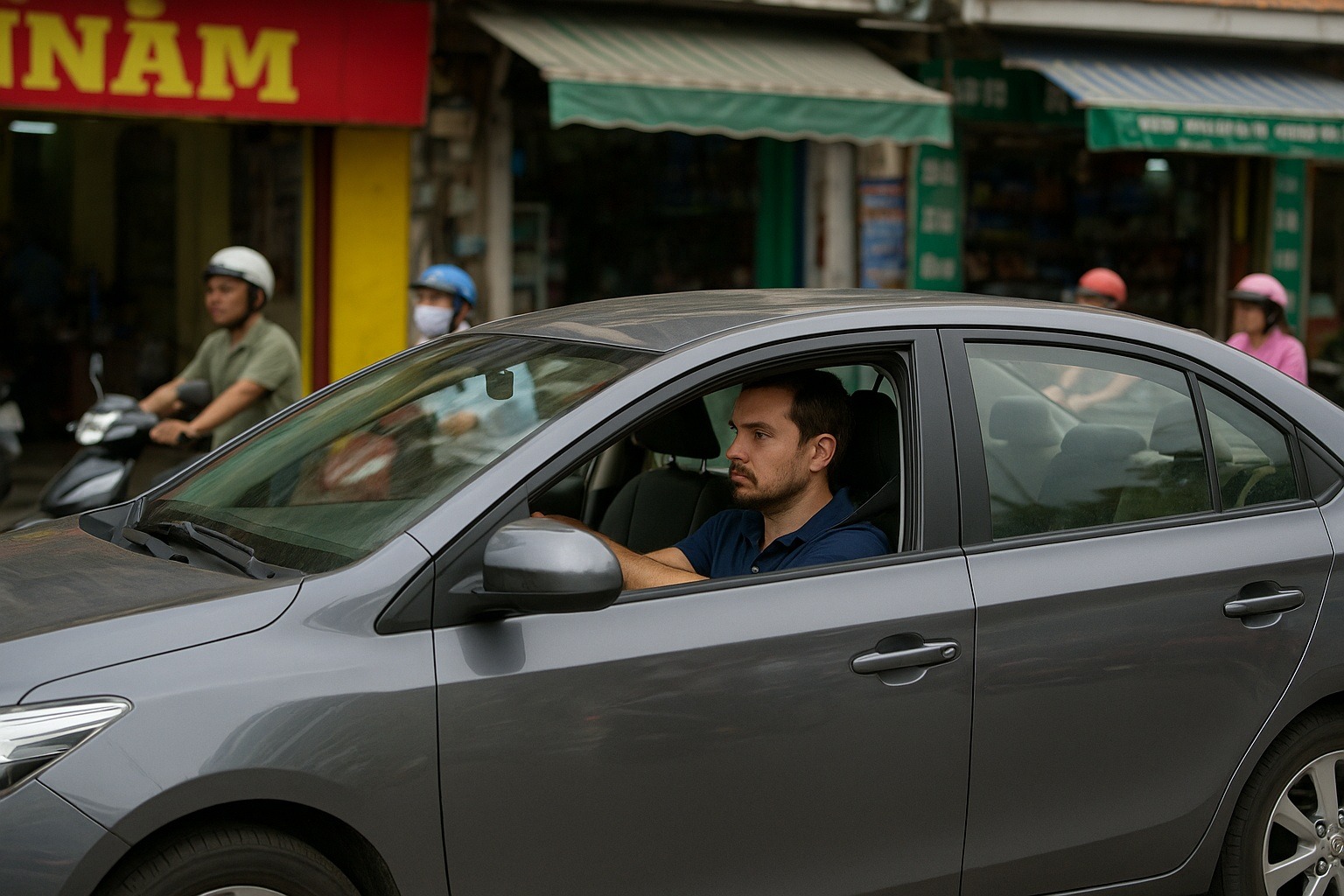
Driving in Vietnam as a foreigner is legal as long as certain conditions are met. Foreign nationals must hold a valid International Driving Permit (IDP) along with a valid driver’s license from their home country in order to drive in Vietnam. However, this only applies to countries that are signatories of the 1968 Vienna Convention on Road Traffic. Drivers from countries that are not part of this convention cannot legally drive in Vietnam and may, in some cases, be required to obtain a local Vietnamese driver’s license. Additionally, those who wish to ride a motorcycle must possess a license that is valid for the corresponding motorcycle category.
Traffic rules and practices in Vietnam may differ from those familiar to foreign drivers. Heavy traffic, lack of clear road signs, the high number of motorcycles, and local driving habits are among the factors that require extra attention. Therefore, even if legal permission is granted, driving in Vietnam demands serious caution and adaptation to local conditions. Moreover, rental companies typically verify the validity of all required documents and may refuse to hand over a vehicle without them. For this reason, it is important to gather comprehensive information beforehand to clarify legal requirements and reduce potential risks.
3. How much does it cost to rent a car? Are prices calculated daily or hourly?

Car rental prices in Vietnam vary depending on the type of vehicle, rental duration, city, and additional services. Typically, the daily rental cost for a compact automatic vehicle ranges between 30 and 60 USD. For SUVs or more luxurious models, this price can exceed 80 USD. For those wishing to rent a motorcycle, daily rates generally range between 5 and 15 USD. Basic insurance and a certain mileage limit are usually included in the price; additional charges may apply for extra mileage.
In Vietnam, rental periods are usually calculated on a daily basis, and most rental companies require a minimum rental duration of 24 hours. Hourly rentals are not common; however, in some major cities (such as Hanoi or Ho Chi Minh City), hourly rates may be available for motorcycles or chauffeur-driven vehicles. In case of exceeding the rental period, companies generally charge an hourly fee or may demand a full extra day’s rate. Therefore, it is important to pay attention to pick-up and return times.
4. What documents are required when renting a car?
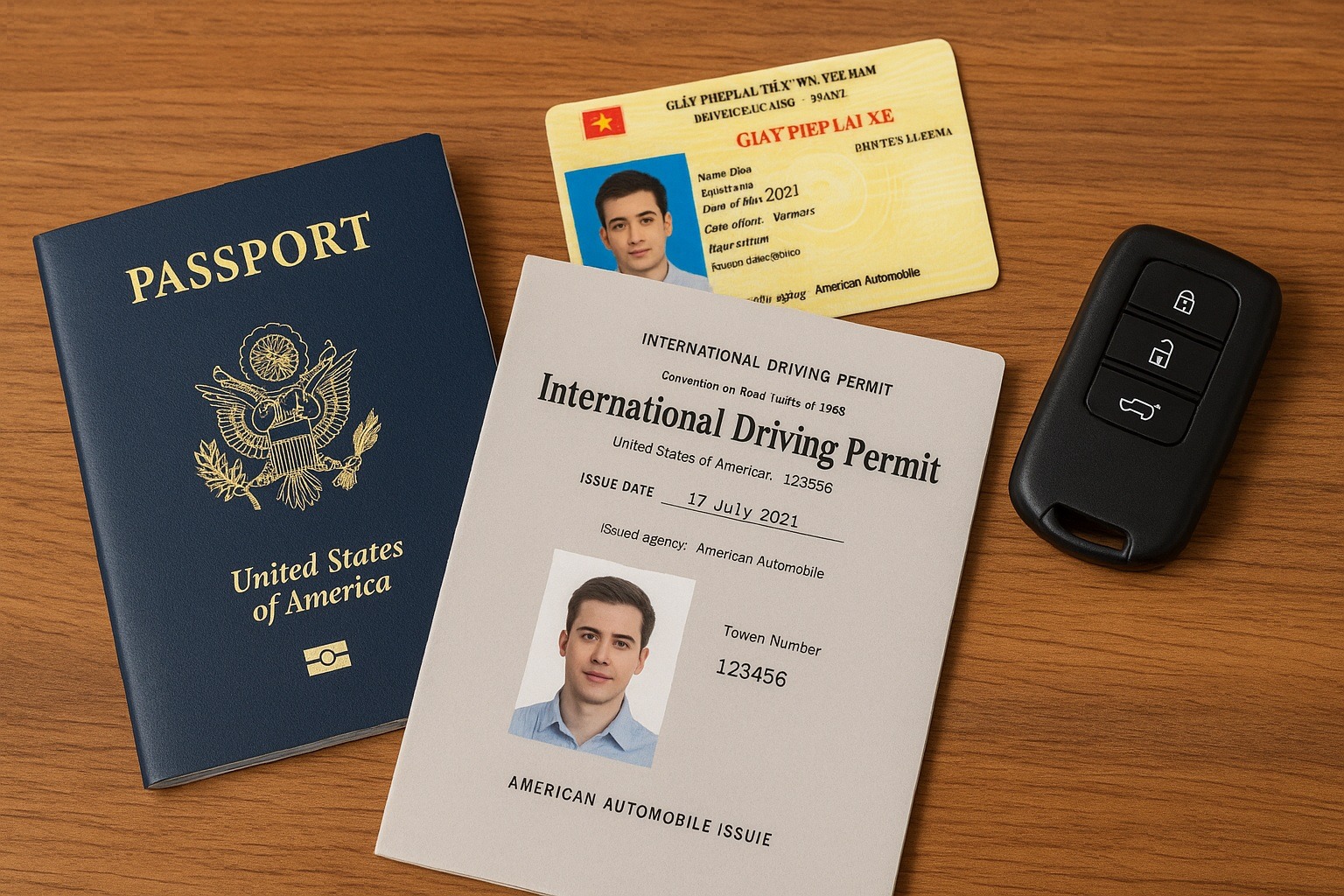
The documents you need to present when renting a car in Vietnam may vary depending on the rental company and vehicle type, but generally, certain standard documents are required. These primarily include a valid passport and a driver’s license from your home country. However, the domestic license alone is not sufficient; an International Driving Permit (IDP) is also mandatory. This permit is especially required for drivers from countries that are signatories of the 1968 Vienna Convention and without it, the vehicle will not be handed over. A photocopy of the passport entry stamp or visa page may also be made for registration purposes.
Additionally, some rental companies may require credit card details as a security deposit, while smaller local firms might ask for a cash deposit instead. When renting a motorcycle, a simple contract may suffice in most cases apart from the license and passport; however, reputable companies may also request an IDP. Having complete documentation is crucial not only for legal driving but also for smooth handling of any potential accidents or insurance claims. Taking photocopies of the documents and reading all terms of the rental agreement carefully also helps ensure a smooth process.
5. Is car insurance mandatory? What does it cover?
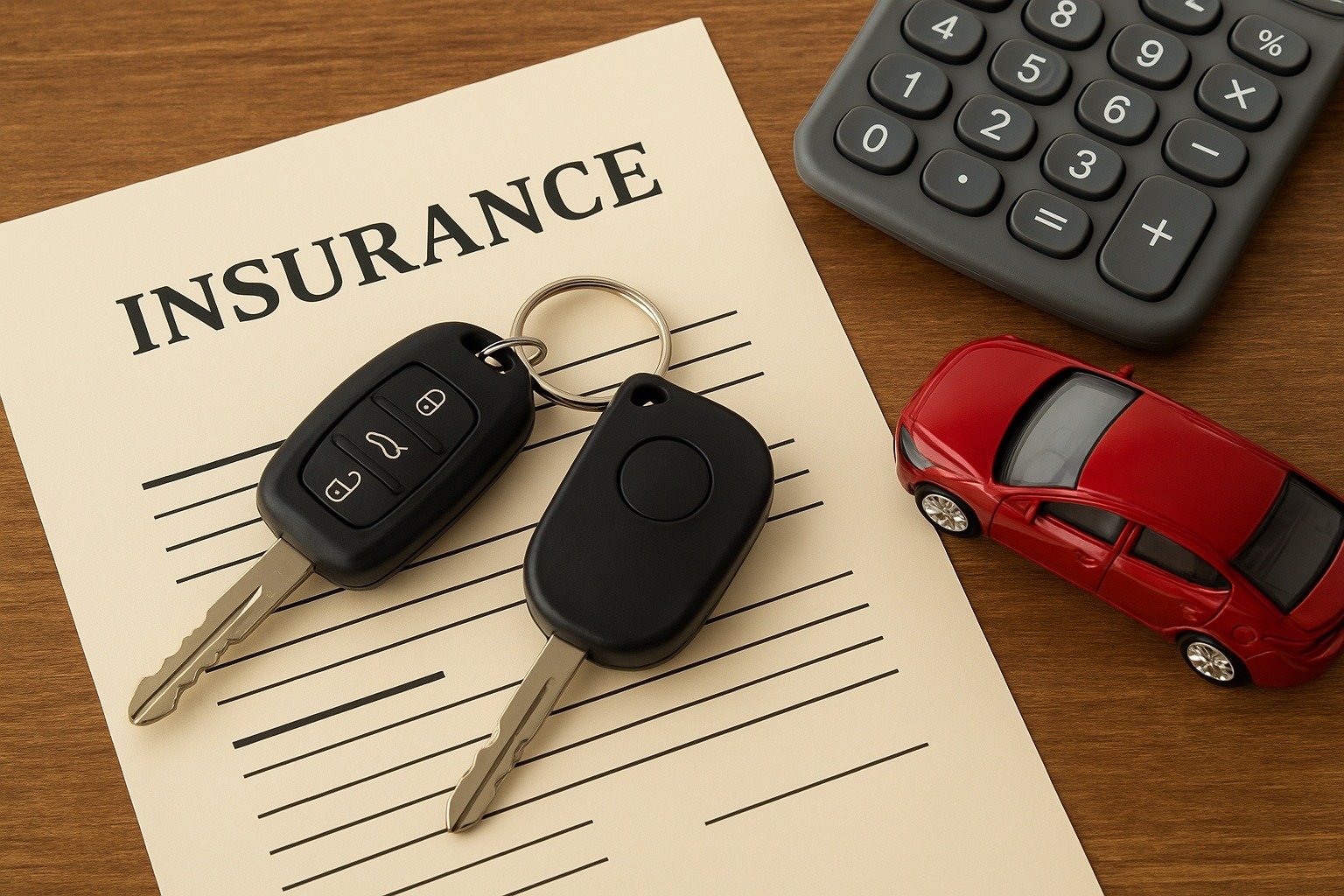
In Vietnam, car insurance is a legal requirement, especially for rental vehicles, and rental companies typically include this insurance as a basic part of the rental fee. This basic insurance usually covers “Third Party Liability Insurance,” which only protects against material damages or injuries caused to third parties. In other words, even if the driver of the rented vehicle is at fault, only the damage caused to the other party is covered. Driving without this insurance is illegal, and its absence during police checks can result in severe penalties.
However, this basic insurance does not cover damages to the rented vehicle itself or cases such as theft. For drivers who want protection against these risks, additional insurance options like Collision Damage Waiver (CDW), Accident Insurance, or Comprehensive Policies are offered. These additional insurances can be purchased for an extra fee and are often integrated into reservations made with credit cards. Carefully reviewing the insurance terms and which damages are covered in the contract is very important to avoid unexpected expenses.
6. What should be done in case of a traffic accident with a rental car?

In the event of a traffic accident involving a rental vehicle in Vietnam, the first thing to do is to stay calm and ensure safety at the scene. If anyone is injured, an ambulance should be called immediately, and assistance requested. Then, the police must be contacted to prepare an official report at the accident site. Although many traffic accidents in Vietnam are resolved with minor agreements, it is important to document the incident when a rental vehicle is involved. The report serves as the primary document for insurance and rental company claims regarding the damage.
The rental company should be informed immediately after the accident. The company will guide you on the procedures to follow and typically assist with insurance paperwork. Damage to the vehicle will be covered either fully or partially depending on the insurance type purchased at the time of rental; if no additional insurance was obtained, the driver may be liable for high repair costs. Therefore, collecting documents and photos at the scene and putting the process in writing are very important.
7. Are there mileage limits or regional restrictions on rental vehicles?
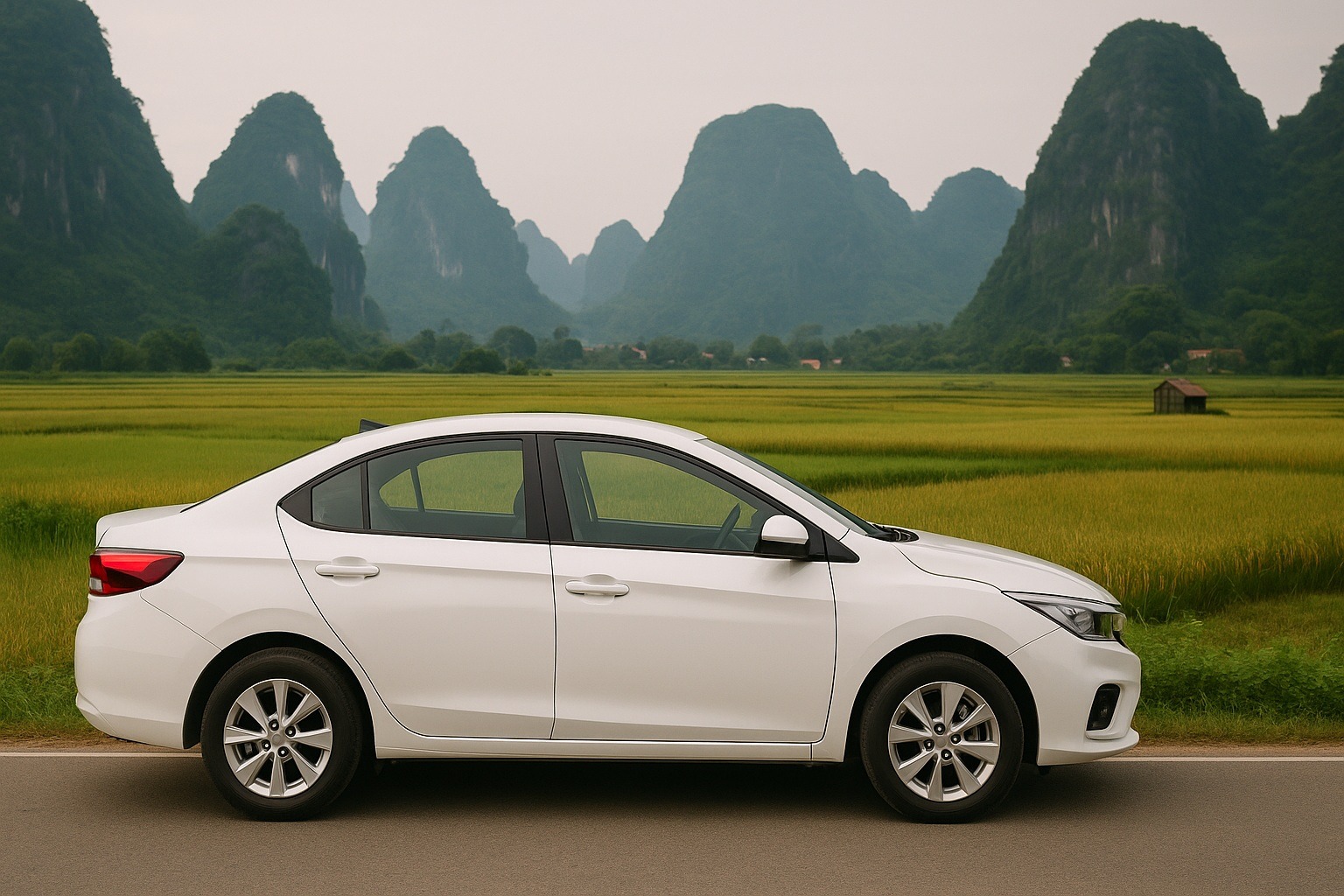
Mileage limits and regional restrictions on rental vehicles in Vietnam may vary depending on the rental company’s policy. Most large rental companies offer unlimited mileage, especially for daily or weekly rentals. However, some budget or local companies may set a specific mileage limit (for example, 100–150 km per day). If this limit is exceeded, an additional fee is charged for each extra kilometer (usually 3,000–5,000 VND per kilometer). Therefore, it is essential to check the mileage policy stated in the rental agreement.
Regarding regional restrictions, some companies allow the vehicle to be used only within certain city limits. For example, driving from Hanoi to distant locations such as Sapa or Ha Long Bay may require prior permission. Additionally, driving in sensitive areas such as mountainous regions or near border zones may be prohibited or require extra insurance coverage. Violating these restrictions can invalidate insurance or lead to legal liabilities. Therefore, it is important to obtain written information about both mileage limits and permitted areas before renting a vehicle.
8. Are the vehicles manual or automatic? Is there a choice?
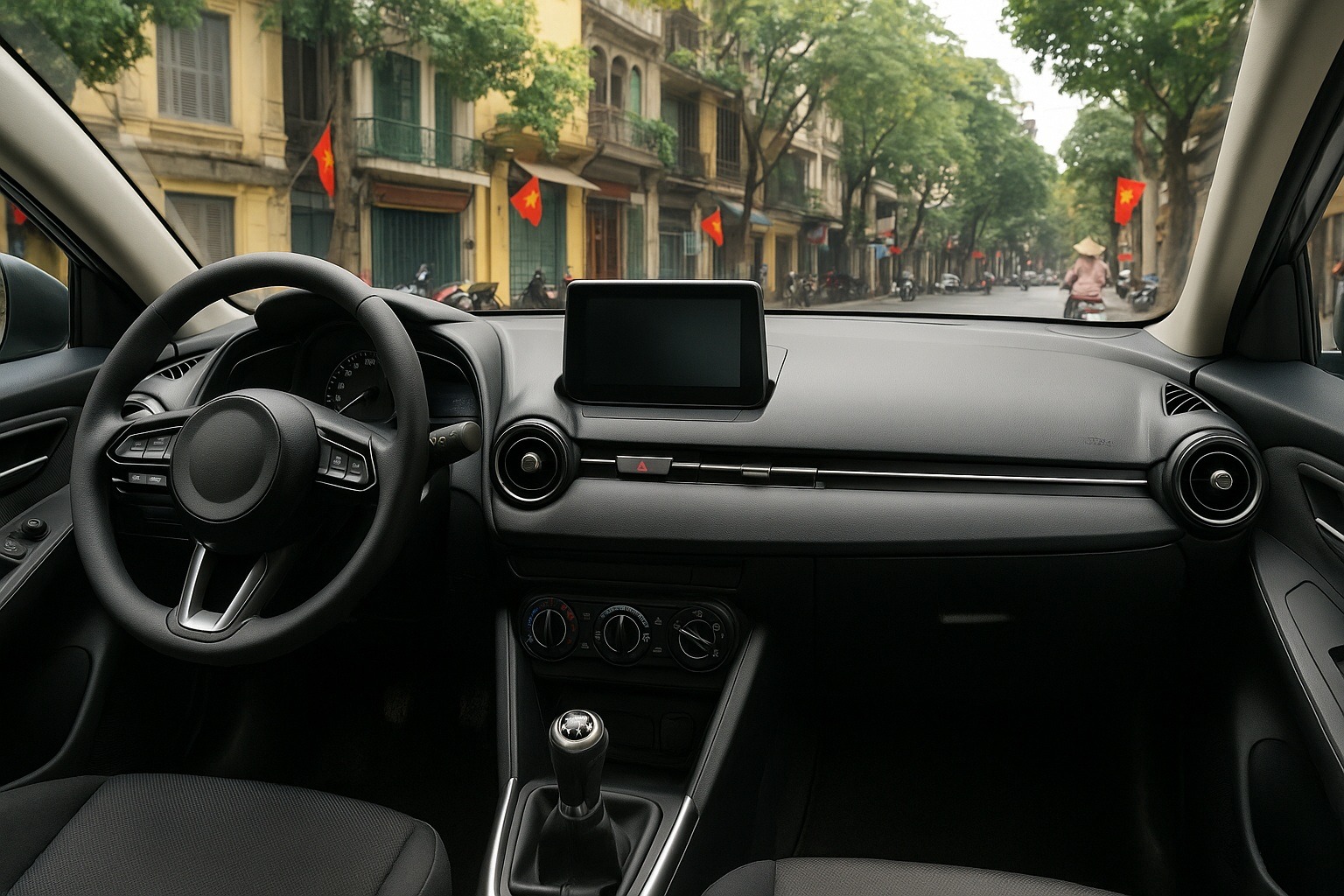
Rental vehicles in Vietnam are generally offered with both manual and automatic transmission options. However, automatic cars are more common in major cities and tourist areas and are especially preferred by foreign tourists. This is because the heavy traffic and irregular driving conditions in Vietnam make driving automatic vehicles more comfortable. Some rental companies offer automatic versions only for certain models, while more economical cars are mostly manual.
When renting a car, transmission type is usually selected during the reservation process. This preference is clearly indicated in bookings made through international platforms or major rental companies. However, if renting directly from local firms, it is important to request automatic vehicles in advance, as some smaller companies may have a limited number of automatic cars. Additionally, automatic vehicles are generally slightly more expensive than manual ones, and this difference may be reflected in the rental price.
9. What should be considered during vehicle pick-up and return processes?
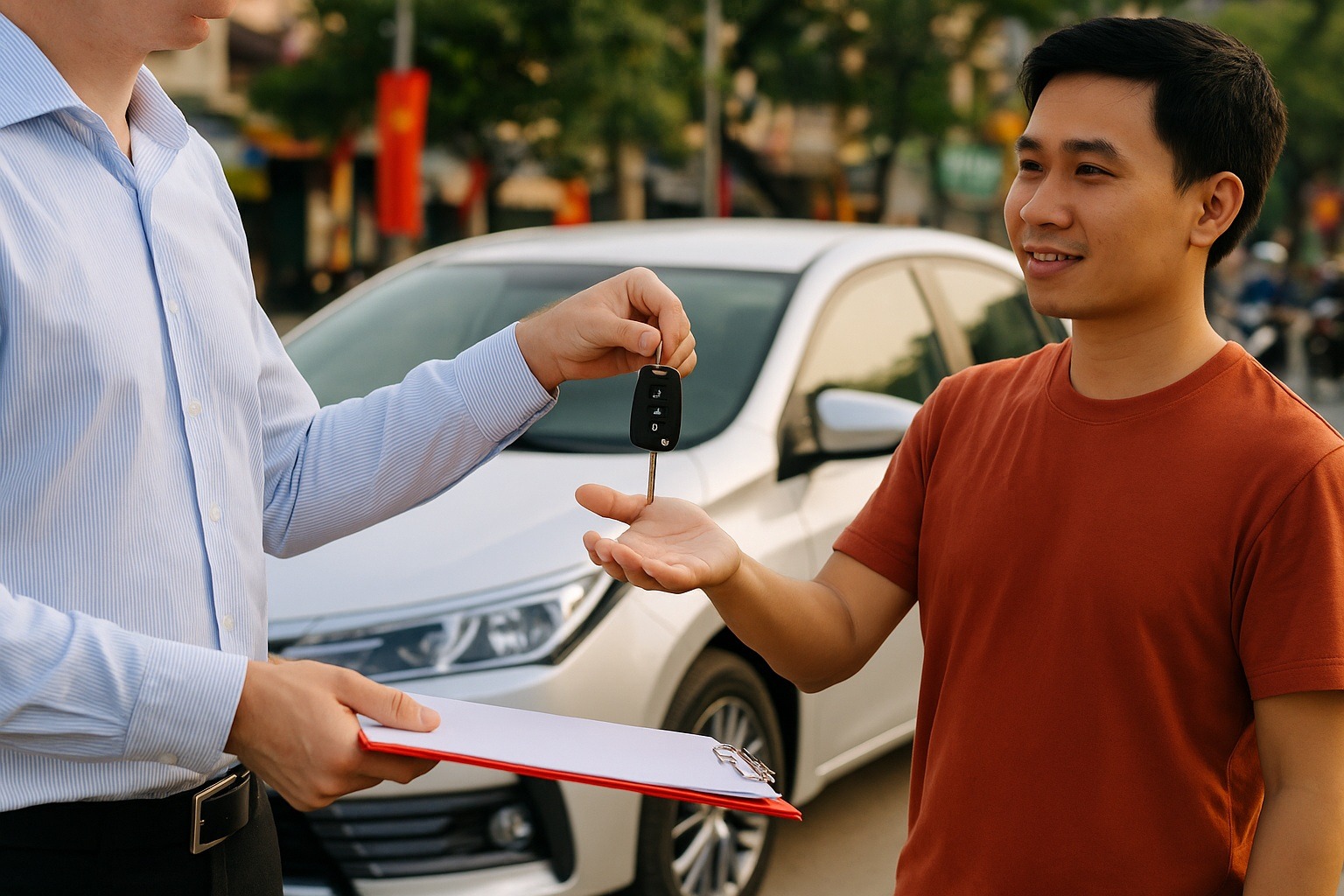
One of the most important steps during the vehicle pick-up process when renting a car in Vietnam is to thoroughly inspect the car physically and ensure that any existing damages are recorded in the rental agreement. The exterior should be carefully checked for scratches, dents, or paint damage; the interior cleanliness, air conditioning, headlights, turn signals, and tire condition must be inspected. The fuel level and, if applicable, the mileage should also be noted at pick-up. If possible, all these checks should be documented with photos or videos, as these serve as evidence in case of disputes.
During the return process, the vehicle must be brought back to the same location and in the same condition as specified in the contract, at the agreed date and time. The fuel level should be the same as at pick-up; otherwise, additional fees may apply. If the vehicle is returned late, extra charges may be applied hourly or as a full day’s rate. Some companies conduct detailed inspections during return as well, so it is important that the vehicle is clean, orderly, and undamaged. Additionally, the process and conditions for deposit refunds should be clearly stated in the contract; these clauses should be read carefully and a return receipt should be obtained.

Additional services offered during the car rental process in Vietnam, such as navigation devices, child seats, and Wi-Fi modems, are generally subject to extra fees. These prices vary between companies, but the average daily fees range from 3 to 7 USD for navigation devices, 5 to 10 USD for child seats, and 6 to 12 USD for portable Wi-Fi modems. Some international companies may offer one of these services for free or provide package discounts for long-term rentals. However, many local companies offer these services in limited quantities, so it is important to make reservations in advance.
The fees for these additional services are usually not automatically included in the rental price; they are added to the contract upon the user’s request. It is essential to verify whether these services have been selected during the vehicle reservation. Since obtaining child seats that meet proper standards may not always be possible, especially for travelers with children, requesting such services in advance is advisable. Additionally, it should be ensured that the devices are delivered in working condition and returned complete; otherwise, extra charges or deposit deductions may apply.
